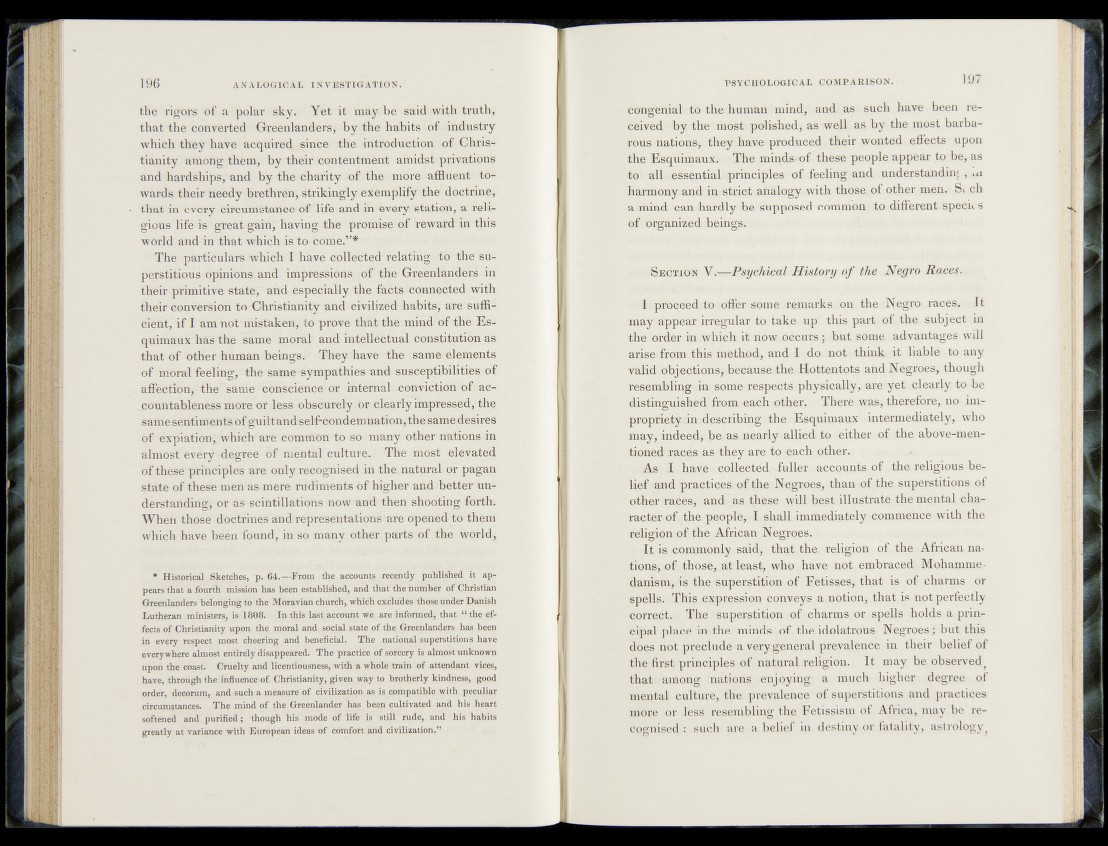
the rigors of a polar sky. Yet it may-'be said with truth,
that the converted Greenlanders, by the habits of industry
which they have acquire^. tMit''introduction of Gltastianity
among them, by their contentment amidst privations
and hardships, and by the chartty tb i the more affinent■ to*
wards their needy brethren, strikingly exemplify the doctrine*
that in every circumstance Of life and in every Station, a religious‘
life is great gain, having the promise of reward in this"
world and in that which is to contie.”*
The particulars which T'have collected'relsitingi to the Superstitious
opinions and impressions of the Greenlanders in
their primitive stated and especially the facts connected with
their conversion to Christianity and civilized habits, are sufficient,
if I am not mistaken, to prove that the mind of the Esquimaux
has the same moral and intellectual constitution as
that of other human beings. They have the same elements
of moral feeling, the same sympathies and susceptibilitifesi ®f
affection, the same conscience or internal conviction of > ae-
countablèness more or less obscurely Or clearly impressed,‘the
same sentiments of gUil t and se lfcond em nati ou^the s am e desires
of expiation* which are comm® to so many other nationsdn
almost evéry-degree of mental culture. The most elevated
of theseprinci pies are only recognised in the natural ; Or pagan
state of these men as mere rudiments of higher and better um
derstandkig, or as'scintillations now and then shooting forth.
When those doctrines and representations are opened to them
which have been found, in so many other parts of the world,
* HietfirWl Sketches, p. 64.—From the accounts reran tly published it appears
that a fourth mission has been established, and that the number of Christian
Greenlanders belonging to the Moravian church, which excludes those under Danish
Lutheran ministers, is 1808. In this last account we are informed, that “ the effects
of Christianity upon the moral and. social state of the Greenlanders has been
in every respect most cheering and beneficial. The national superstitions have
everywhere almost entirely disappeared. The practice of sorcery is almost unknown
upon the coast. Cruelty and licentiousness, with a whole train of attendant vices,
have, through the influence of. Christianity, given way to brotherly kindness, good
order, decorum, and such a measure of civilization as is compatible with peculiar
circumstances. The mind of the Greenlander has been cultivated and his heart
softened and purified; though his mode of life is still rude, and his habits
greatly at variance with European ideas of comfort and civilization.”
congenial to the human mind, and as such have been received
by. th e . most polished, as well as by the most barbarous
nations* they have produced their wonted effects upon
the Esquimaux^ The ;jaoinds^of these people appear to be, as
tot alf+essential principles of feeling and understanding , »a
harmony and in strict .analogy with, those of other men. S» ch
a mind can hardly be supposed common to different speck s
of organized, beings.
S ectio n Psychical History o f the Negro Races.
I pÉoceeè to^offer some .remarks, ion the Negro races. It
may appear irregular to take up this part of the subject in
the order in which it now occurs ; but some advantages will
arise from this method, and I do not think it liable to any
valid objections, because the Hottentots and Negroes, though
resembling in somtei respects physically, are yet clearly to be
distinguished from.)each other. There was, therefore, no impropriety
in describing the Esquimaux intermediately, who
may* indeed* he as nearly allied to either of the above-mentioned
racés as they are to each other.
.. As I have collected fuller accounts of the religious belief
and practices of the Negroes, than of the superstitions of
other races-, and - as these will best illustrate, the mental cha-
racter of the people, I shall immediately commence with the
religion of the African Negroes.
It is commonly said, that the religion of the African nations,
of those, at least, who have not embraced Mohammedanism,
is the superstition of Fetisses* that is of charms or
spells. This expression conveys a notion, that is not perfectly
correct. The superstition of charms or spells holds a principal
place in the minds of the idolatrous Negroes ;; but this
does not preclude a very general prevalence in their belief of
the first principles of natural religion. It may be observed^
that among nations enjoying a much higher degree of
mental culture, the prevalence of superstitions and practices
more or less resembling the Fetissism of Africa, may be recognised
! such are a belief in destiny or fatality, astrology ?